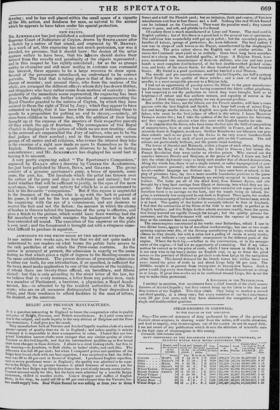NEW PRINTS.
MR. ACKERMANN has just published a coloured print representing the Supreme Court of Judicature at Ceylon, drawn by STEPHANOFF after a sketch by a native of that island, and engraved by W, BENNET. As a work of art, this engraving has not much pretension, nor was it intended, we presume, that it should have : the design of the artist appears rather to have been, that his labours should derive their interest from the novelty and peculiarity of the objects represented ; and in this respect he has rightly calculated ; for as far as groups motley in character and still more motley in costume can command this interest, there appears to be a large resource to draw upon. Several of the personages introduced, we understand to be correct portraits. The trial that is taking place is that of five natives on a charge of murder; and around these, who form the nucleus of the whole, are arranged the different officers whom duty has drawn thither, and stragglers who have rather come from motives of curiosity : inde- pendently of the immediate scene represented, the engraving has been given to the public with the further intention of commemorating the Royal Charter granted to the natives of Ceylon, by which they have secured to them the right of Trial by Jury; which they appear to have estimated so highly, that it has been the means of inducing them to accede to a proposition for putting an end to slavery,—namely, all slave-born children to become free, with the addition of their being brought up at the expense of the masters of their respective parents till they reach the age of fourteen. The consequence of this Royal Charter is displayed in the picture of which we are now treating: close to the accused are empannelled the Jury of natives, who are to be the final judges of their conduct ; and in the foreground are various groups of all castes and all religions, who evince the interest they take in the exercise of a right now made as open to themselves as to the English. Doubtless such an epoch deserves to be had in lasting remembrance ; and Mr. ACKERMANN has displayed his usual tact in turning it to account. A very pretty engraving called "The Sportsman's Companions," engraved by GILLEN after a drawing by COOPER the Academician, has just been published by MOON, BOYS, and GRAVES. The group consists of a genuine sportsman's pony, a brace of spaniels, some game, the gun, &c. The lassitude which the artist has thrown over the action of the pony and dogs is well-timed and natural ; but we doubt whether that will be sufficient to justify, in the eyes of the mere sportsman, the vigour and activity for which he is so accustomed to look in his favourite "companions." But if this repose is ungrateful to the freeman of the woods, who is up with the lark in pursuit of his game, it will not be the less appreciated by those who look at the engraving with the eye of a connoisseur, and are desirous to receive the fact and not the fiction : the manner in which the clump of bushes is thrown behind the haunches of the pony is effective, and gives a finish to the picture, which would have been wantiny, had the fiat Moorland scenery which occupies the background to the, right been extended all round. The execution of the engraver on the plate is very neat ; and the foreground is brought out with a crispness some- what difficult to produce in aquatint.
ADMISSION TO THE PRINT-ROOM AT THE BRITISH MUSEUM.
IN our notice two weeks ago, we fear that we did not quite make it understood to our readers on what terms the public have access to the rich portfolios of art which the Print-room contains. As the matter is arranged at present, the admission is exactly on the same footing as that which gives a right of ingress to the Reading-roorns in the same establishment. The person desirous of procuring admission to either (or both, for one introduction, if so specified, is sufficient for the two), must make application to one of the trustees of the building; of whom there are twenty-three official, six hereditary, and fifteen elected: but this is only according to the Strict letter of the law, for we believe that in every instance, a letter from any public man, such as a member of Parliament, a barrister, a physician, a Royal Acacle- meeian, &c.—is attended to by the resident authorities at the Mu- scum; who are on all occasions distinguished by their disposition to Oblige, and their readiness to afford facilities to the man of letters, the student, or the amateur.


















 Previous page
Previous page